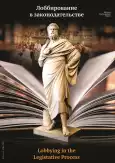Обжалование незаконных действий должностных лиц в уголовном процессе: правовые и доктринальные основы
- Авторы: Ильин Д.В.1
-
Учреждения:
- НО Московская коллегия адвокатов «Единство – Солидарность»
- Выпуск: Том 2, № 1 (2023)
- Страницы: 37-43
- Раздел: Уголовно-правовые науки
- URL: https://bakhtiniada.ru/2782-7372/article/view/145645
- DOI: https://doi.org/10.33693/2782-7372-2023-2-1-37-43
- ID: 145645
Цитировать
Аннотация
В статье представлены результаты исследования правовой и научной сторон обжалования незаконных действий должностных лиц органов следствия и дознания стороной защиты. Данная проблема является многоаспектной и включает такие составляющие как конституционно-правовые основы, уголовно-процессуальную регламентацию и научное сопровождение права на обжалование незаконных процессуальных действий как механизма преодоления нарушения прав подозреваемых/обвиняемых на стадии предварительного расследования. Одной из распространенных форм таких нарушений являются необоснованные отказы в реализации процессуальных прав подозреваемых/обвиняемых, в частности, на предоставление доказательств, участие в доказывании, ознакомление с материалами дела. Последствия такого нарушения могут выражаться в невозможности должным образом построить защиту, в том числе от необоснованного обвинения и, как следствие – незаконных задержании, заключении под стражу или содержании под стражей, привлечении заведомо невиновного к уголовной ответственности или незаконном возбуждении уголовного дела, вынесении заведомо неправосудных приговора, решения или иного судебного акта. Данные нарушения, очевидно, носят комплексный характер и препятствуют реализации принципа равенства и состязательности сторон в уголовном процессе. К сожалению, следователи и дознаватели зачастую отказывают стороне защиты в праве представлять доказательства и приобщать их к уголовному делу, а в обеспечение этого отказывают обвиняемому и защитнику в праве на ознакомление с материалами дела, пользуясь при этом лазейками в законодательстве и размытыми (подчас слишком широкими) трактовками в руководящих актах судебного толкования. Это приводит к фактической безальтернативности версии обвинения и, безусловно, к существенному нарушению прав обвиняемых как участников уголовного судопроизводства. Негативными последствиями этого могут быть как случаи необоснованного обвинения и осуждения невиновных лиц, наступления иных тяжких последствий (например, болезни незаконного обвиненного/осужденного лица, нанесения имущественного ущерба в ходе основанной на ложном обвинении конфискации имущества, применения иных имущественных санкций, дискредитации и диффамации такого лица и т.п.). Кроме того, безусловно подобная практика наносит серьезный ущерб авторитету суда, правоохранительных органов, формированию негативного общественного мнения о них. В статье на примере дел, имеющих большой общественный резонанс и личного опыта работы автора в качестве адвоката по таким делам, подробно анализируются случаи отказов в представлении и приобщении доказательств, ознакомлении с материалами дела, разбирается «аргументация», приводимая сотрудниками органов предварительного расследования, судьями, наглядно доказывается ее ошибочность. Исследуются уголовно-процессуальные средства противодействиям таким нарушениям. В заключение на основе проведенного исследования автор формулирует вывод, направленный на преодоление обвинительного уклона и нарушений прав участников судопроизводства по делам, имеющим общественный резонанс, совершенствование и повышение эффективности предупреждения нарушений конституционного права на защиту и состязательность сторон.
Ключевые слова
Полный текст
Открыть статью на сайте журналаОб авторах
Данила Владимирович Ильин
НО Московская коллегия адвокатов «Единство – Солидарность»
Автор, ответственный за переписку.
Email: 8438@apmo.ru
кандидат юридических наук, полковник полиции; пенсионер МВД РФ, адвокат, НО Московская коллегия адвокатов «Единство – Солидарность». Москва, Российская Федерация.
Россия, г. МоскваСписок литературы
- Громов Н.А., Зайцева С.А., Пономаренков В.А. Достоверность и вероятность доказательств // Следователь. 1999. № 7. С. 11–17.
- Ильин Д.В. Противодействие нарушению принципа состязательности сторон в уголовном процессе // Пробелы в российском законодательстве. 2022. № 5. С. 404–412.
- Определение Конституционного Суда РФ от 18.07.2017 № 1545-О «Об отказе в принятии к рассмотрению жалобы гражданина Вихарева Романа Вячеславовича на нарушение его конституционных прав положениями статей 119, 122, 125 и 144 Уголовно-процессуального кодекса Российской Федерации» // Официальный сайт Конституционного Суда РФ. URL: https://legalacts.ru/sud/opredelenie-konstitutsionnogo-suda-rf-ot-18072017-n-1545-o (дата обращения: 17.03.2022).
- Перлов И.Д. Надзорное производство в уголовном процессе. М.: Юрид. лит., 1974. 256 c.
- Постановление Конституционного Суда РФ от 20 января 2023 г. № 3-П «По делу о проверке конституционности части первой статьи 125 Уголовно-процессуального кодекса Российской Федерации в связи с жалобой гражданина В.А. Саркисяна». URL: https://www.consultant.ru/document/cons_doc_LAW_438079/ (дата обращения: 17.03.2023).
- Постановление Конституционного Суда РФ от 21.11.2017 № 30-П «По делу о проверке конституционности положений статей 38 и 125 Уголовно-процессуального кодекса Российской Федерации в связи с жалобой гражданина В.В. Ченского» // СПС КонсультантПлюс. URL: http://www.consultant.ru/document/cons_doc_LAW_283210 (дата обращения: 17.03.2022).
- Постановление Конституционного Суда РФ от 29.06.2004 № 13-П «По делу о проверке конституционности отдельных положений статей 7, 15, 107, 234 и 450 Уголовно-процессуального кодекса Российской Федерации в связи с запросом группы депутатов Государственной Думы» // СПС КонсультантПлюс. URL: http://www.consultant.ru/document/cons_doc_LAW_48286 (дата обращения: 17.03.2022).
- Постановление Пленума Верховного Суда РФ от 10.02.2009 № 1 (ред. от 29.11.2016) «О практике рассмотрения судами жалоб в порядке статьи 125 Уголовно-процессуального кодекса Российской Федерации» // СПС КонсультантПлюс. URL: http://www.consultant.ru/document/cons_doc_LAW_84964/ (дата обращения: 17.03.2022).
- Стецовский Ю.И., Ларин А.М. Конституционный принцип обеспечения обвиняемому права на защиту / отв. ред. В.П. Кашепов. М.: Наука, 1988. 320 c.
- Уголовное право. Особенная часть: учебник / под ред. д-ра юрид. наук, проф. И.В. Дворянскова. М.: ИНФРА-М, 2023. 583 с.
- Якуб М.Л. Проблемы оценки доказательств в советском уголовном процессе // Вестник МГУ. 1974. № 6. С. 18–20.
Дополнительные файлы








